Water levels are dropping and water cuts are looming… So how come our future looks brighter than ever? One reason is the mass-migration from urban to rural living that's driving a mega-trend of self-sufficient communities… And exploding the demand for our clean water solutions! Plus, our Water on Demand™ and Water4Us™ initiatives' potential to supercharge fulfillment? Find out about the clean water revolution in this video!
Introduction
I'm Riggs Eckelberry co-founder, chairman, CEO of Origin clear. The government needs to continue to provide a lot of abundant clean water, but what happens to it after it's used when it's dirty? Do you know that 80% of all sewage is never treated, it's just dumped? That leads to water scarcity, but it also leads to a lot of disease and pollution, the ocean turning into something horrible.
At the same time, the cities and counties are not getting the funding they need to really treat the water and so they can't keep up. The solution is let the people who use the water clean the water. Water on demand is investment in actual capital assets that earn income. Sign up to hear my weekly briefing every Thursday night. 5 p.m. Pacific, 8 p.m. eastern. Just put Aussie Gold slash CEO in your browser. Register for the briefing and look forward to hearing more from you.
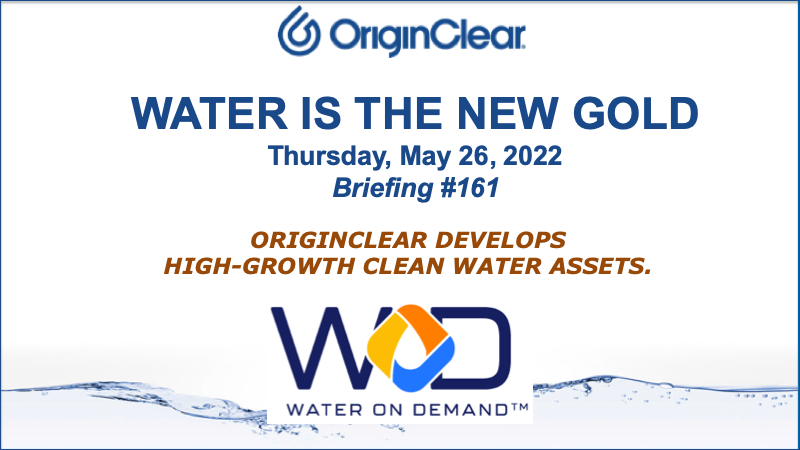
Riggs: Good evening, everyone. Welcome to the CEO briefing the last one of May 2022. What I'm going to do is I'm going to move straight into this podcast that I recorded with Mariska Nell, very smart lady, and this has our latest thinking. And Sharon Skonetski says, "Hi from Washington State. We have lots of water here from out of the sky!" That is for sure. All right. And we'll get this party started.
Start of presentation
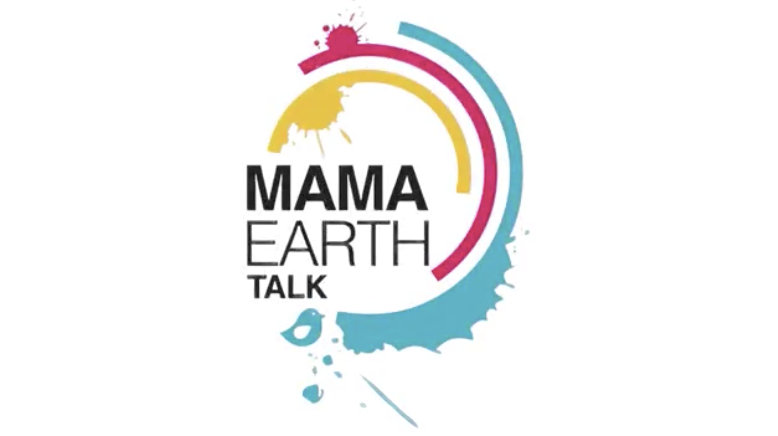
Mariska: Welcome to the podcast, Riggs.
Riggs: Mariska it is such a pleasure.
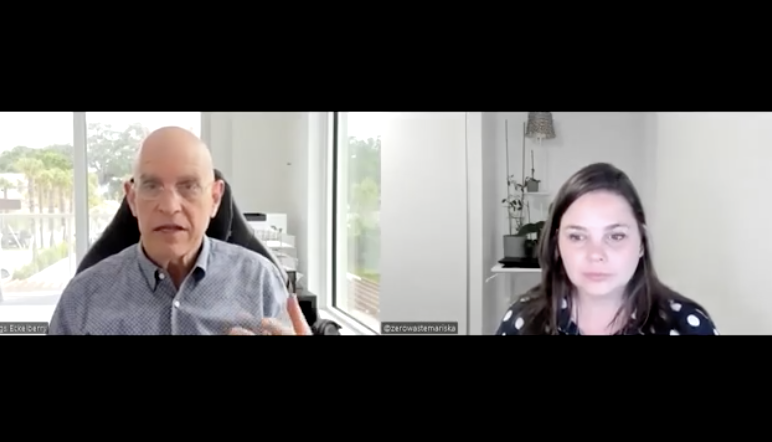
Mariska: You are the founder and the CEO OriginClear, but what exactly is OriginClear?
Riggs: We think of ourselves as The Clean Water Innovation Hub™. And what that means is we come up with new ideas to transform the industry. We create those into businesses, and then we launch them into the world. The one we're doing currently, for example, is a way to make it possible for people to put up water systems without having to pay up front, just pay on the meter as if they were paying the city. But they're paying us instead.
Let's say you're a brewery and you're producing too much beer and now the city won't take your effluent, which happens a lot. You can have your own facility, you don't have to pay up front and you also have full maintenance. So it's sort of an instant solution to the water problem. And for investors, it's kind of like receiving royalties from an oil well, except it's water. Right. So that's what we call "Water like an Oil Well™".
So that project is called Water on Demand and we just launched it as an independent company under our ownership. And investors are coming in to capitalize it because when you offer water equipment to a customer for free up front, somebody has got to buy it for you. So we have investors who buy the machines and then they receive a residual over the lifetime of the system. And so they get a productive asset, the user gets equipment without having to go into their capital or debt or whatever, and we are able to scale very widely.
So there's that. We're also planning a water coin which would represent the water asset and ultimately we think create a water marketplace, a world water marketplace. We are also spinning out certain, We have certain technologies that we've incubated in-house that are now in revenue and soon we'll be able to also go out. So we have about five properties in OriginClear that we're simply putting on the launch pad.
Now, this is a big change from even three months ago when we were very much about creating a more dense death star of value, everything packed in. But we realized that that didn't do justice to a lot of what we're doing because it's like having a large family, you know, there's always some kid who's like, "Where'd Jim go?" You know, so as a result, we felt that parts of the of the company were not really being served well.
And we realized that actually launching them and crowdfunding them would be a great way to create a bunch of small public companies and, you know, so replication you might say. And just push them out. And then we would, of course, own the largest part of all these companies. And over time, we want to do a lot of these. We think that it's not one invention, it's not one initiative that's going to change a water industry, it's a series of them over time. And that's the machine we built.
Mariska: Yeah. Oh, wow. It sounds like you guys are extremely, extremely busy, but I just want to kind of take a step back. So obviously, you know, a lot of these facilities will be kind of treatments of the water, but just to kind of give some of our crazy bits, you know, a little bit deeper dive like, you know, why is it so important for you guys to have these facilities so that you can actually treat the water? Why is that treatment of the water so important.
Riggs: In the world? 80% of all sewage is never treated at all. It's just dumped. In the US, UK, Dubai, New Zealand that's not so it's the inverse, but in places like Bangladesh almost all of it is dumped. And so you have a big problem with the rivers, lakes and oceans and the groundwater becoming polluted. For example, California has a terrible problem with hydrocarbon pollution of its groundwater. Why? Because they've been very permissive with the oil industry and allowed it to basically sprinkle its reject water onto the hillsides without filtering. And over time, that destroys the water.
So we have to clean the water. Now, that's just the treatment side. But we intervene at the cleaning of the clean water at the head end, treating the dirty water and also recycling the treated water. All three and especially we have a new program that's called Water4Us. It's just started, which is we realized that we starting to get clients who were these...
There's a lot of migration happening in America where people are moving away from the big cities to what's called secondary cities. And actually a couple of years of Prince Charles spoke about that, about how the need for secondary, the growth of secondary cities to take the load off the big mega megalopolis, which we've now seen there's terrible problems with supply chain and and potentially exposure to infectious disease. I mean, you know, we've had COVID, but I can tell you that a farmer in the middle of the Midwest has not had a COVID problem.
This is not exposed to other people. Right. So if we can spread out the population, it's actually a good thing. And we're seeing people do that naturally. So people are leaving the big cities, moving to places like here in Florida. In fact, we my wife and I moved in 2020 from Los Angeles to the west coast of Florida. And in part it was because, you know, it's like, you know, like this is just becoming a little bit nuts. And a lot of people are like that. Now, what's happening is they're moving in to places where there's not adequate sewage and not adequate water supplies. And so there is an opportunity to give them complete water self-sufficiency.
So imagine that you buy a house, a tract in the middle of Pennsylvania, 50 acres, and it's very cheap because sewage is miles away. But then you create your self contained system and now you've just created housing development without having to dig up a bunch of sewage lines, which is expensive and also disruptive. So that Water4Us project basically says we're building self sufficient human communities with this technology and it uses the Water on Demand financing engine. So when that housing development is built, they're not going to have to buy and have to spend $1,000,000 upfront for that water system. It'll be part of the dues paid by the homeowners.
Mariska: Oh, that's amazing. And I mean, coming originally from South Africa, like, I mean, you know, a couple of years ago, there was like that. They kind of called it day zero. That was approaching. And that was the day that Cape Town would literally be without water because, you know, they yeah. So, you know, water is becoming so, so important, you know, and to be able to have clean water is even more important. And I mean, I work with a lot of organizations that actually helps also to provide clean water and sanitation to some countries that, you know, the women still literally walks like kilometers every single day to just like, you know, get their daily water.
And here we are, you know, just opening every single tap and so fortunate to actually have water. But, you know, who says that's going to be the case for all of us in, you know, another 50 years if we just, you know, just like waste water as we are currently doing. So, I mean, what you guys are doing is really, really so crucial to kind of put all of those ends together and to make sure that people are able to actually treat the water like kind of where they at. Because, I mean, the facility will be like kind of with you. You know, it's like a contained system as far as I understand. Am I correct? Yes.
Riggs: It's modular. And it's we have a technology for Modular Water Systems™. They're prefabricated and they just drop them in place. No muss, no fuss, connect them and you're done. That's part of what makes it work very well. But you were talking about Cape Town. You know, I think you remember that Cape Town was resolved. Resolved by simply making the farmers take less water. Yeah, that was the solution. But it didn't help the farmers. Right.
And the same thing is happening in Northern California, where nobody can figure out what to do because it literally running out of water. And the only solution is to instead of growing, avocados and almonds grow, you know? Kale or barley, which are more drought resistant. And unfortunately, the farmers like, well, excuse me, I built my business on avocados. And so this unfortunately right now, there's trade offs. The first thing we have to do is we have to make proper use of the water, which means recycling. America today is terrible at recycling, Israel recycles almost 90% of its water. The second in the world is Spain, actually at 20% and then the US is at 1%.
Mariska: Wow, that's shocking!
Riggs: And the reason is that... Well, here's why, because we have older water systems, they were all built in one direction. The water flows from, let's say, Beverly Hills in Los Angeles, downhill to the El Segundo water plant by the Santa Monica Bay. And then it gets treated and they put it in the Santa Monica Bay. It doesn't go back up to Beverly Hills, to get reused. It's not designed that way. It would be impossible. And now it's all built up.
What are they going to do, build huge aqueducts going back uphill? So the way the centralized systems are built, they just don't allow for wholesale recycling. But if you're doing your own treatment, you can recycle. You have the water, you treated it now you can put it on the lawn, you know, the golf course or even theoretically, all this water can be reused to drink, but nobody wants to. But the fact is that maybe we're getting to that point where we got to think like astronauts and reuse all that water for our own consumption.
Mariska: You are actively kind of involved in or working in the crypto or like blockchain products to sort like kind of support their financial decentralization of water with the blockchain. Like. Can you share more about this?
Riggs: Well, it's fascinating. First of all, I mean, Mariska, The problem with water is that the price is different everywhere. It might be very, very cheap in one place and very expensive in another. And so it's very hard to create a global market. The oil industry is standardized around the price of West Texas crude and Brant crude. Those are the standard prices. But we don't have any such thing in water. It's highly localized.
So how do you create a global market? Because it makes sense that if you have a water risk in northern California, you should be able to hedge it by buying options on Singapore water, which is very plentiful. Right. You can't there's no such thing. So there's a need for a marketplace. We believe it can be done through crypto. Here's how. By creating these pay per gallon systems where people fund water treatment systems that are then returning royalty to investors, we now have a flow of dividends, right?
With that money going to the investor. Now we package that into an asset coin or an NFT. Doesn't matter how, but there's a packaging of it and that coin holds all of the future revenues from that contract. And let's say that I go, Ok, the contract is worth, I don't know, half a million dollars. I'm going to resell it to Mariska, and all I'm going to do is just do a change of address and boom, it's yours. Now, they'll also be broken, they'll be broken down into much smaller pieces than half a million.
But the point is, it's kind of like in this country, there was an American football player who took his contract and created a coin that sold off pieces of his future contract. So people got pieces of the contract and he got the money now. Right. So he got, he sold it a discount, obviously, but he got present money and they got potentially future money, assuming that he didn't get injured, right?
So, yeah, that's the same kind of idea, which is that you take a productive asset and you put the future income stream in the coin and now you are able to move it around. That mobility, we think eventually can create a water marketplace because that's what's happened already with the, I don't know if you know what NFTs are, but nonetheless, it's a type of asset and it's very easy to transfer Non-fungible means this is it's unique, right? So it's unique, it says this is that water, that water not the other water. And so it ties it to specific contract.
And then once you have those contracts and they all have pricing that is standardized and now we're starting to move to a water marketplace that will take a while. But we believe that, look, the crypto world is moving away from what they call shitcoins, which are basically just scams and it's moving towards coins to have something behind them.
Mariska: Exactly.
Riggs: In this case they'll be monetized water supporting a coin. And I think that's very healthy.
Mariska: So the coin is actually called?
Riggs: Dollar sign H2O.
Mariska: $H2O®. So that's the coin. But you also have a separate like part, which is called ClearAqua. Can you.
Riggs: You read! Well, I like that.
Mariska: Thank you. Can you tell us more about the ClearAqua project?
Riggs: Well, dollar $H2O is a fine coin. And by the way, these, these will be, one of the good things about doing this sort of hub and spoke approach to launching things is we don't have to mix up the coin with something else. It's going to have its own rollout so that you do financing through the crypto world, which is very specific.
Anyway, the problem with $H2O is it's a security. Why? Because it pays dividends. In the United States, you cannot market a coin that's a security unless it's to the upper 1%. Right. So what about, what about everybody else? So we thought, well, wait a minute, let's make a coin that's not a security, and it's more like a community sort of kumbaya. Let's all pull together kind of thing, where you have a network with people on the ground spotlighting problems, reporting them up to delegates.
This is if you've ever read about delegate proof of stake,. DPoS, which is, a man named Larimer built it. It's wonderful, but it puts humans in the system to basically be proctors for the process. And then they gather up these problems and turn them into proposals which then go over the bridge to this $H2O side for the financing.
This entire ClearAqua community process is open to anyone. Why? Because it's not intended to make money for people. Oh it may be worth money over time, but that's not the purpose of having it. There wasn't having it is to make the world a better place and to have make better water by having a an intelligence network, shall we say, of community activists who are all of us.
Mariska: Riggs What would you say is kind of next for like OriginClear? I mean, you guys are already having so much going on, but kind of what would you see? Like what's next for you?
Riggs: Well, okay, so here's what's happening because we've made a decision to instead of bulk up value, instead of launch it out into the world, we're turning OriginClear into more of a mothership that will do all of the shared marketing, finance, personnel, legal, etc. for all of the children so that these spinoffs don't have to have all those. They can just focus on what is specific to them. And so we're building that right now. We're building that sort of central resource capability. And we're doing the first launch, which is Water on Demand. Next up will be the crypto.
After that there will be a rollout of a, what we call conveyance which is moving water. There's a technology for that and then after that anyway, so we have a series of these lined up in the future, but to make it work, we have to have a good central service point and that's the future of OriginClear, which will gain revenues from managing all of these, all of its children and also have shares of large piece of all of them.
And so I think that by ownership, OriginClear is going to do very well. That's my, certainly my hope after all these years. But I have enjoyed finally I've enjoyed it. It's been very, very tough. I have to say, during COVID, we had the worst time because our business model was not fixed and we were operating at the speed of the water industry, which is not fast enough. Yeah, best patient. And finally, though, the work is hard, but it's fun.
Mariska: Well, it sounds like it's really rewarding as well. So, you know, thank you for all the work that you doing. You know, it really it does make such a difference. And I'm sure, you know, it's going to have an impact on a lot of people around the world in the future.
Riggs: Mariska it's been such a pleasure. I love the thorough and interesting nature of your podcast, so keep up the good work.
Mariska: Oh, thank you so much. And I think that is a wrap.
Riggs: Thank you to your audience and let's all pull together to make it a more sustainable world.
End of presentation
Riggs: Mariska is actually normally based in Dubai, but she got, she's in Perth, Australia, sort of a COVID refugee, with her husband. But she told me she likes Dubai very, very much. It's quite an amazing place to be based, certainly for crypto people in the crypto world. And who knows? We do have plans for building finance outposts in other financial hubs of Water on Demand.
So the whole idea for for scaling up Water on Demand is we do it here, we do it well for the United States, and then we do other regions, always remembering that we stick to finance and don't try to build every machine, which is what would slow things down tremendously.
What Can Be Done About It
Good. So with that, I'm going to talk about what I referred to in my CEO update yesterday, this water disaster in the American West and what can be done about it.
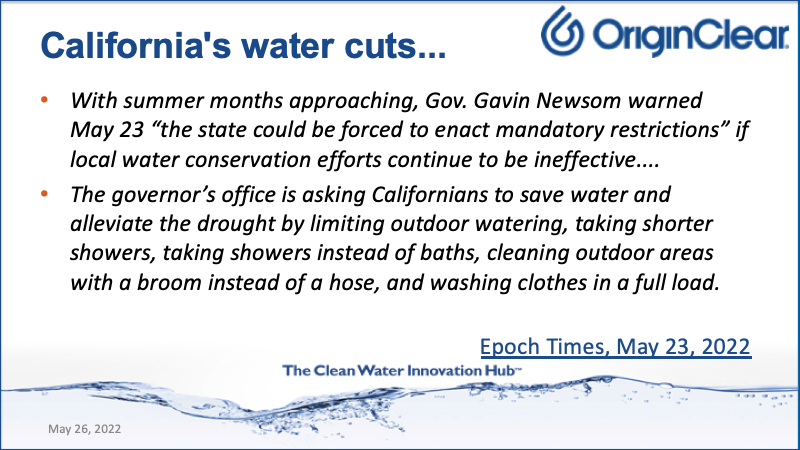
All right. So there's cuts coming, mandatory restrictions, saving water, limiting outdoor water, etc. But let me tell you something, there's something about this that you need to know. And I'm going to continue in a second here.
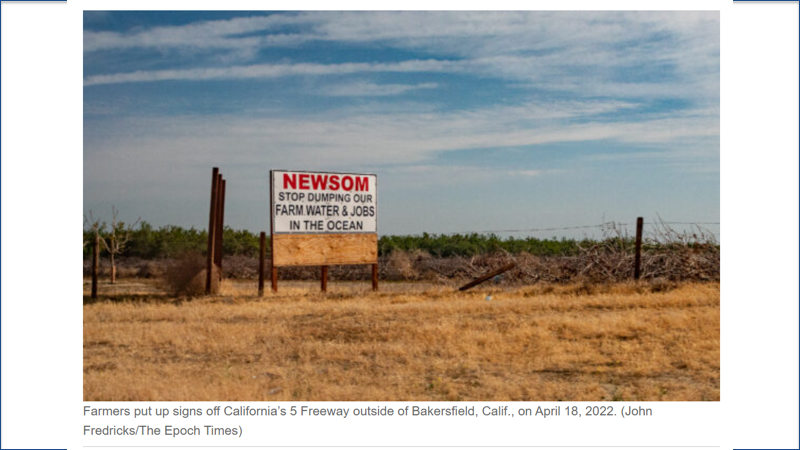
Farmers, farmers are upset and they don't want their water to be dumped. That's not really what's going on. But I'll get to that in a second.
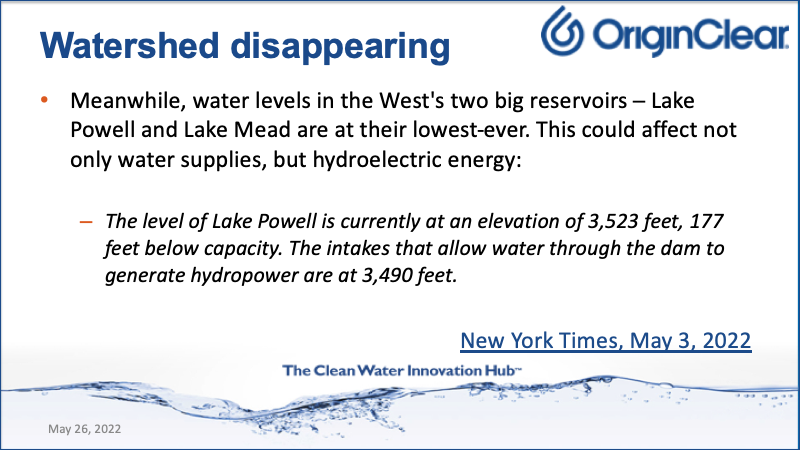
And even worse is the electrical generation out of our two big Lake Mead and Lake Powell are at a level that it's literally going to stop generating power.
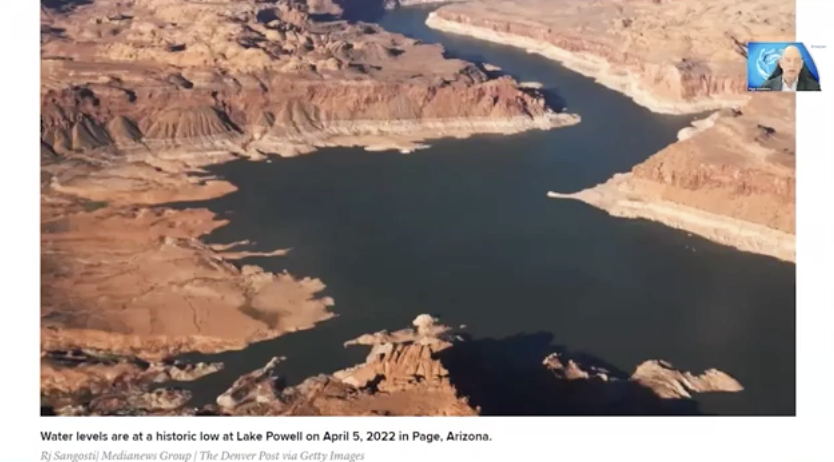
And here is a picture April 5th of Lake Powell, which is, when you see it from the air, it's this long zigzag, looks like a long lizard. It goes on and on and on. And you can see it's several hundred feet down. It's not a pretty picture.
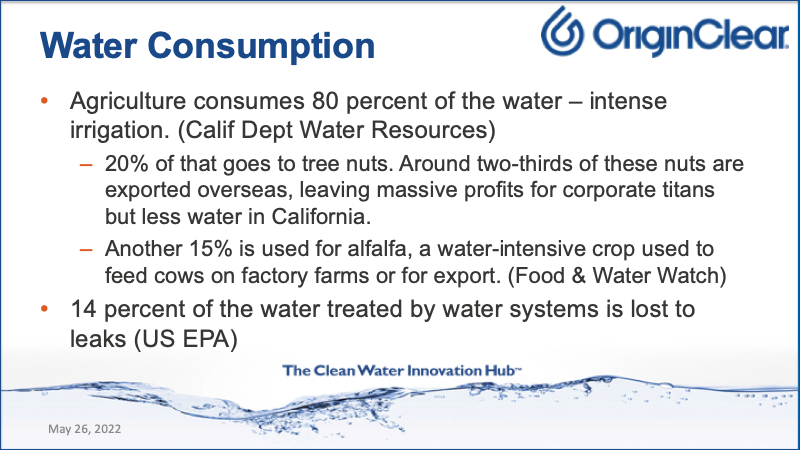
What's Going On?
So what's happening? What's the story? Well, here's the story. Agriculture consumes 80% of the water in California, intense irrigation, and so using up groundwater. 20% of that goes to tree nuts and about two thirds of those nuts are exported. Which according to Food and Water Watch, has an opinion about it, that's for sure, leaving massive water, massive profits for corporate titans, but less water in California. Another 15% is used for alfalfa, which also is very water intensive. And then 14% of the water treated by water systems is lost to leaks. So that can be a big chunk. So think about that 14% in treatment. But the 80% is an important number.
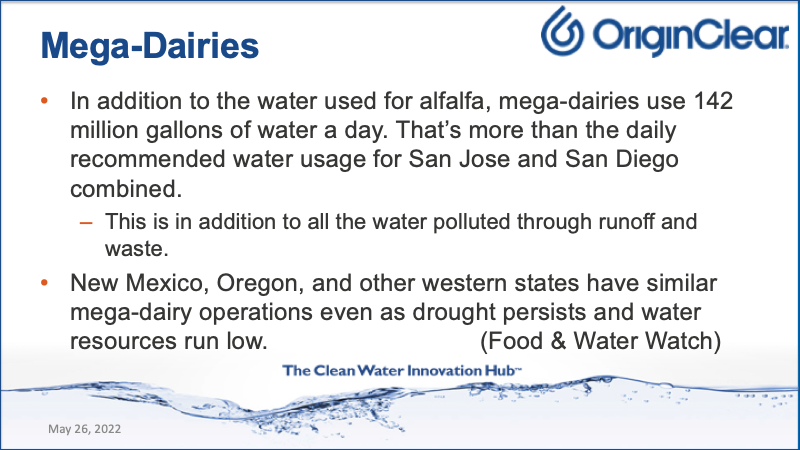
Won't Change Things
Now, in addition to the water used for alfalfa, there's also the mega dairies. And the stat here from these food and water watch people is that, they use more water per day than San Jose and San Diego combined. And of course, they have a lot of runoff and waste themselves and they have similar problems in New Mexico and Oregon. So here's the point. Go ahead. Take the showers in LA, San Jose and San Diego. That's not where the big change is going to happen. So, unfortunately, consuming less at the household level is not a big, it's,. I'm not going to say you shouldn't do it, do it when you can, but this is not going to affect things tremendously.
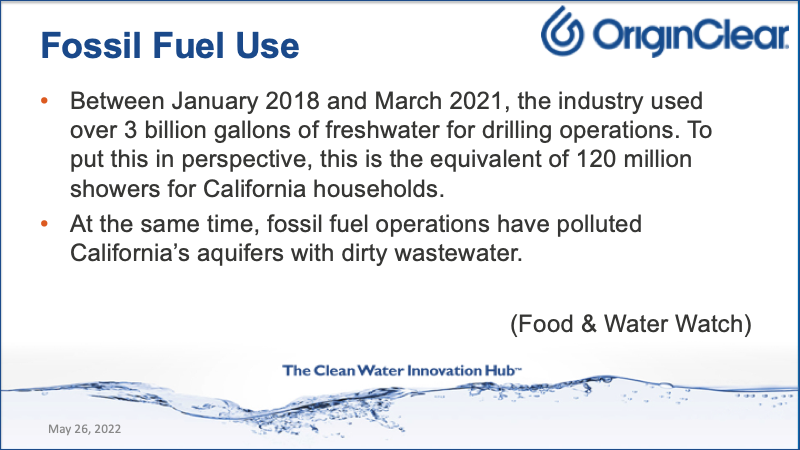
Polluted Aquifers
Fossil fuel, they're actually, think about it, this amount of freshwater they used to drill with was millions of showers for California households. And there's a lot of pollution of the aquifers. And I mentioned Mariska in my in my podcast.
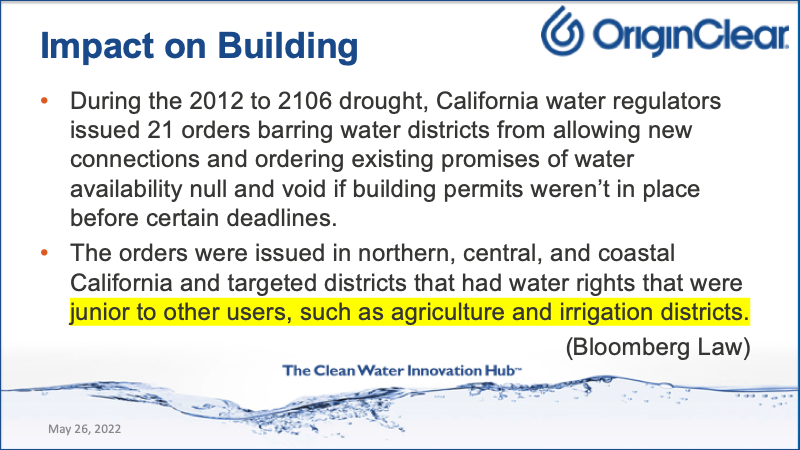
Big Users
All right. And then there's a problem with getting things built. You, basically they're not getting things built, and now California has a big problem. They really, really need housing. But the water rights were junior to agriculture and irrigation. So you see agriculture is a senior user and it's the biggest user by far.
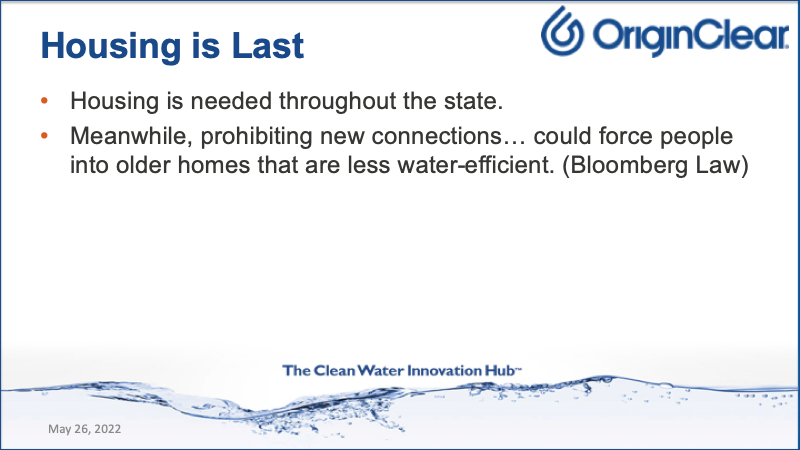
So here's the issue, according to Bloomberg Law, that housing needed, of course, we know that California has big need for housing, but they're not allowing new, new water connections. And that actually, ironically, forces people to stay in older homes that use more water. It's kind of an ethical situation.
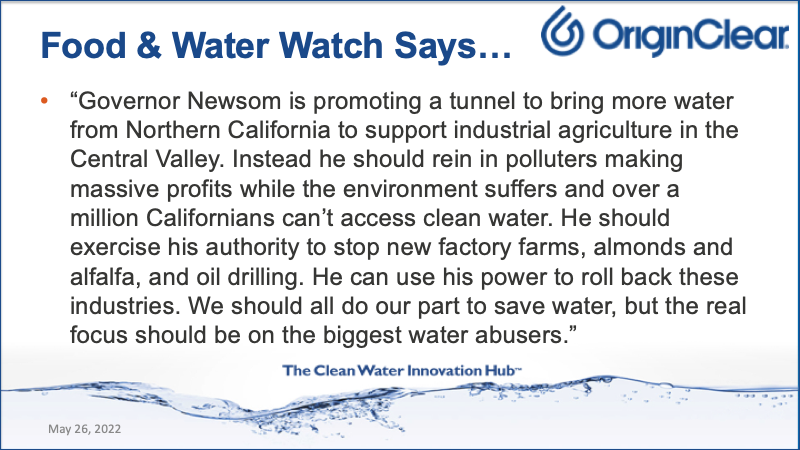
Now, this is what Food and Water Watch says. I'm not, this is not, I'm not saying this is my position. But they're not happy about Governor Newsom promoting a tunnel to support industrial agriculture. He should be all over the polluters. He should stop the factory farms, zones, etc. I don't think Food and Water Watch is aware of who is lobbying in Sacramento, literally paying the bills of these people's political campaigns, both for the governor and the assembly. So it's not exactly a realistic thing.
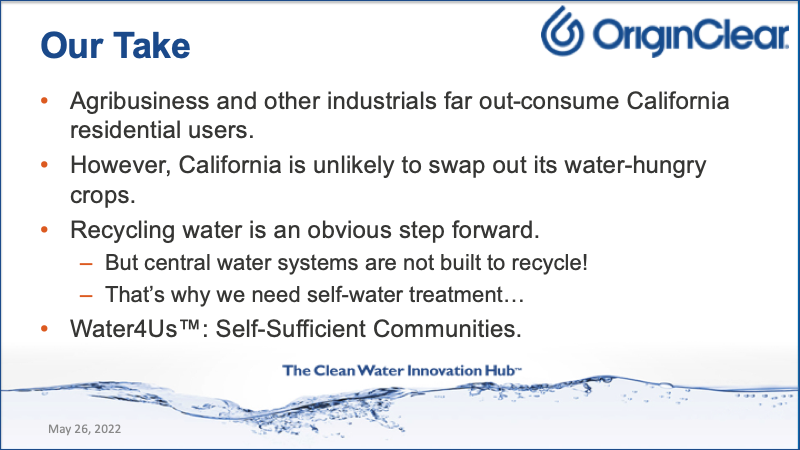
Our Take
Here's our take. It's true that agribusiness and other investors far out-consume California residential users, however, it's not going to be swapped out anytime soon. So what do we do? Well, recycling water. Remember what I told Mariska, that whereas Israel recycles 90% of its water. America recycles only 1%. Well, that's a scandal. And we can have a dramatic increase in water by recycling, but the central water systems will not do it. That's why it's not part of anybody's plan at the state level. But self water treatment does it, and that's why our Self-sufficient Communities initiative is so important.
So we're on the right track here to get recycling going. Now, should we do desalination? Absolutely. I think it's terrible that this Huntington Beach desalination project, after years and years of years of money spent on it, finally got killed. Because it has, it has its negatives. I'm not saying it's perfect project, but this is what California needs. So it's going to be very, very hard to get any kind of desalination done for California. So big problem.
Now there's some other solutions to get water, but those are the realistic ones. So that is that I wanted to cover that and kind of to zero in on the problem. Recycling is going to help and that's what we're doing. So that's very important.
OriginClear and Houston Polytank
We, the team was in Texas, Tom Marchesello and Dan Early were in Texas to visit Houston Polytech. And let's take a look at what, I have short clip as they were there on site and you'll be able to see what they do. It's super interesting.
Start of video presentation
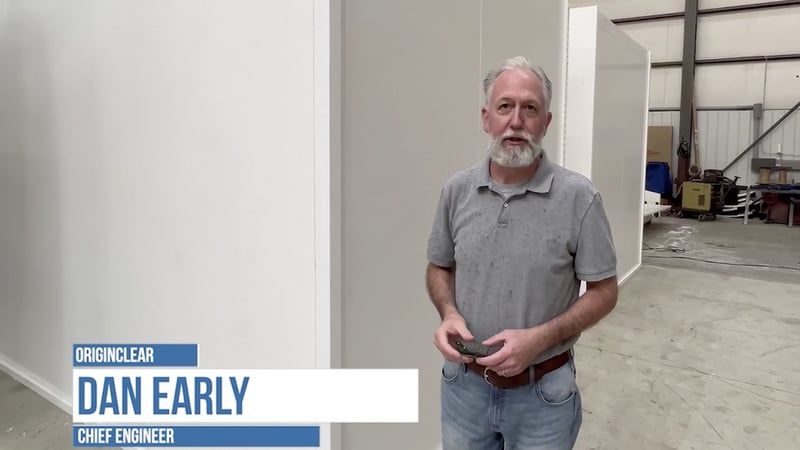
Dan: I'm Dan Early, chief engineer with OriginClear and Progressive Water Treatment, the Modular Water Systems™ division manager. Today we are here looking at the rectangular structural inserts that are part of the EveraSKID 10K MBR (Membrane BioReactors) wastewater treatment packages. These are 30 feet long, 50 millimeters thick. Polypropylene tanks compartmentalized. These will be inserted in a 40 foot high cube container.
And then we'll take them and we'll do a technical up fit with all of the membrane modules, the wastewater treatment equipment, and have a fully detailed plug and play equipment room. We have two of them, one going to a single family residential development in North Texas. A second one is going to a campground customer in Pennsylvania. And we just recently took a production order for a third one for another campground in southern Indiana.
Dan: They both make the 40...
Tom M: What is it?
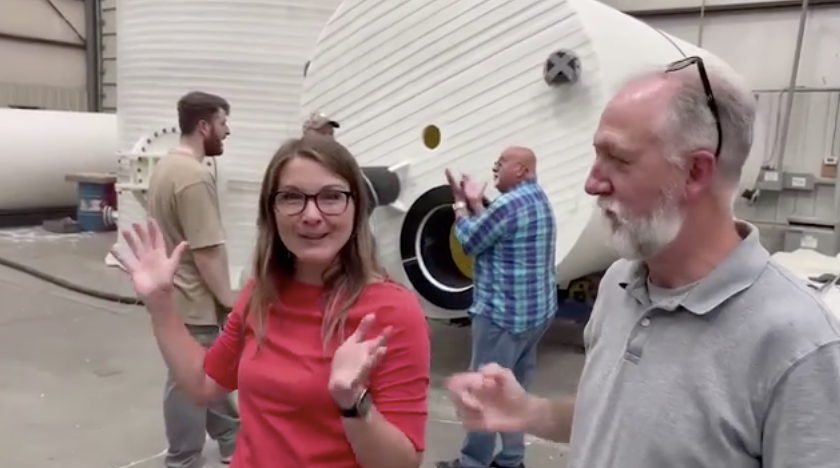
Michelle Welch: The largest mold in the world, Yea.
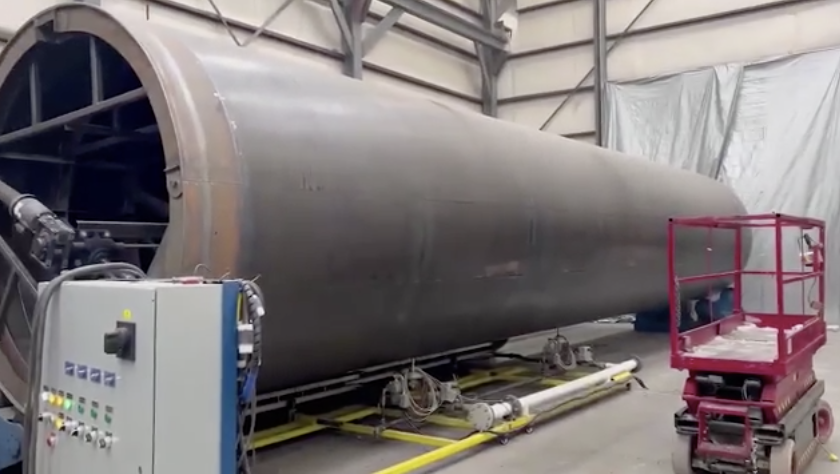
Tom M: That is the largest mold in the world. That's big. Here's an example of one working right now. So, see the heat source down there. It heats the plastic as it's rotating around the drum. And it just keep layering and layering and layering.
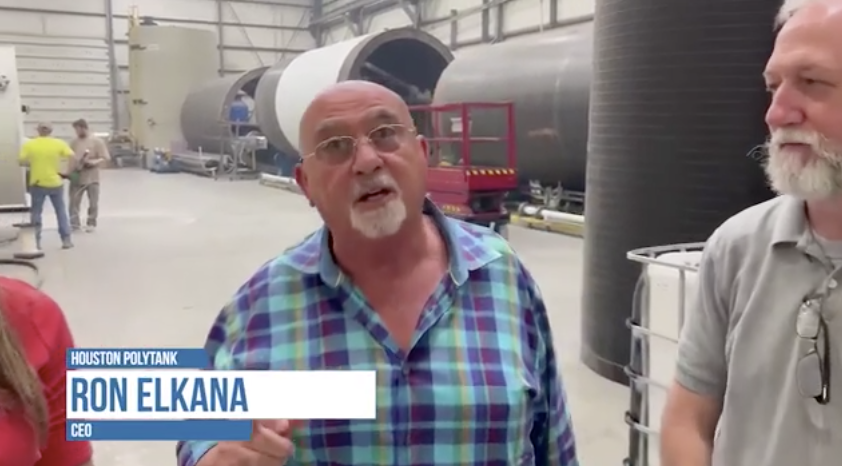
Ron Elkana: We extrude plastic over the drum. We have different sizes of drum between 26 inches up to 13 foot. Many, many drums, many different sizes. And we can build tanks to any length we want. The smallest I can be 55 gallon, and we can go to about 50,000 gallon plastic tanks that can be used for any type of reactors that can be work, water, wastewater and so forth.
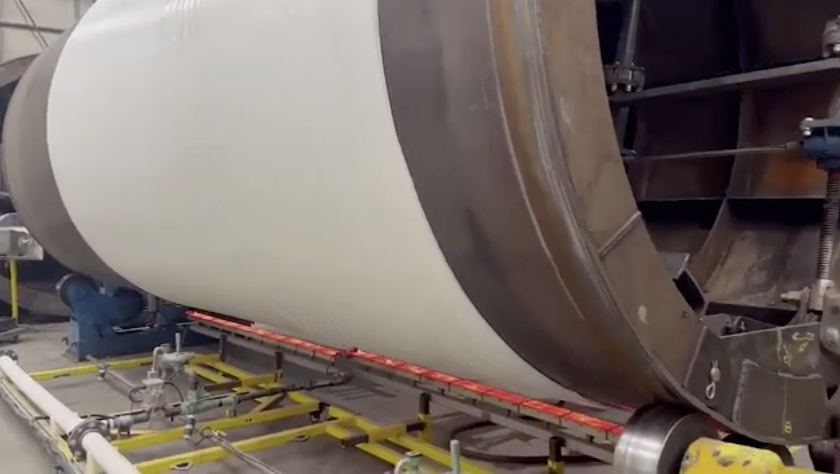
Tom M: What you're watching here is the drum rolling the plastic. So there's a heating element underneath that's heating the plastic as it goes around. It's being wound from the other side on a feeder. And this will take about 10 hours to form an 11 foot tank.
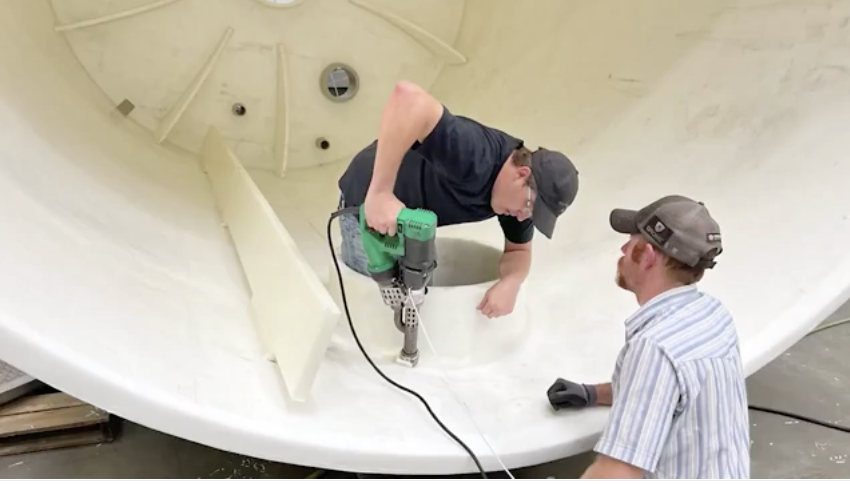
They'll do it in shifts for the guy who feeds it on the other side.
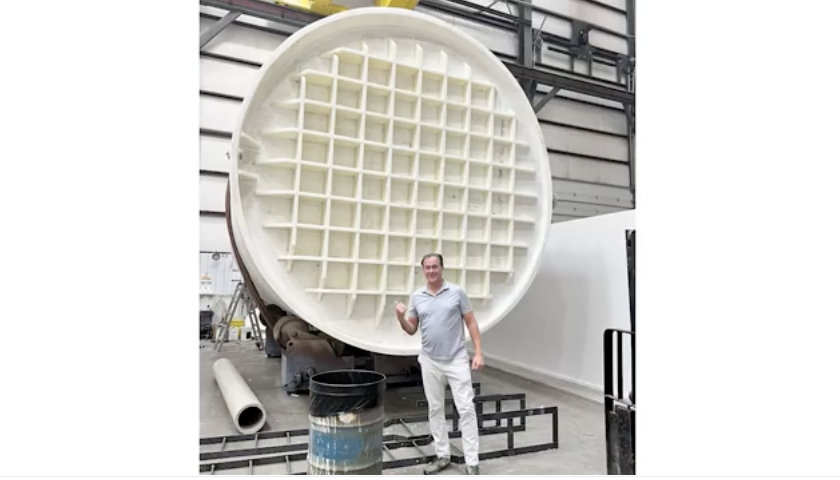
Then once it's completed, it'll cool and they'll slide it off the roller.
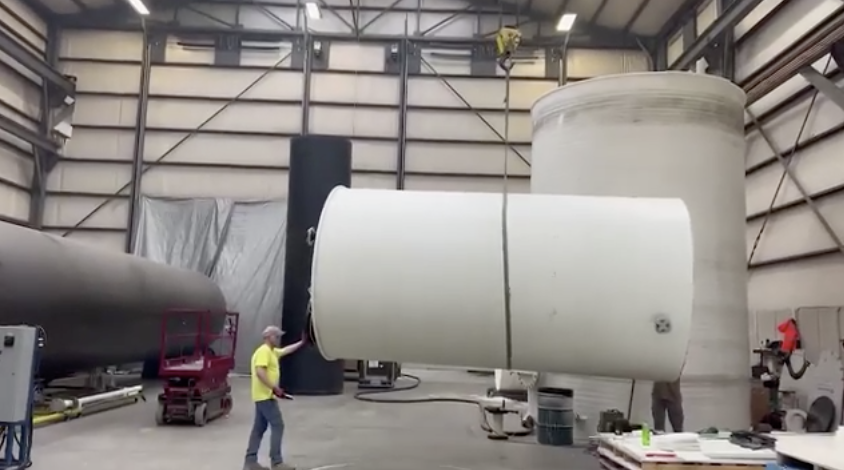
And you'll see a finished version of it over there in the corner.
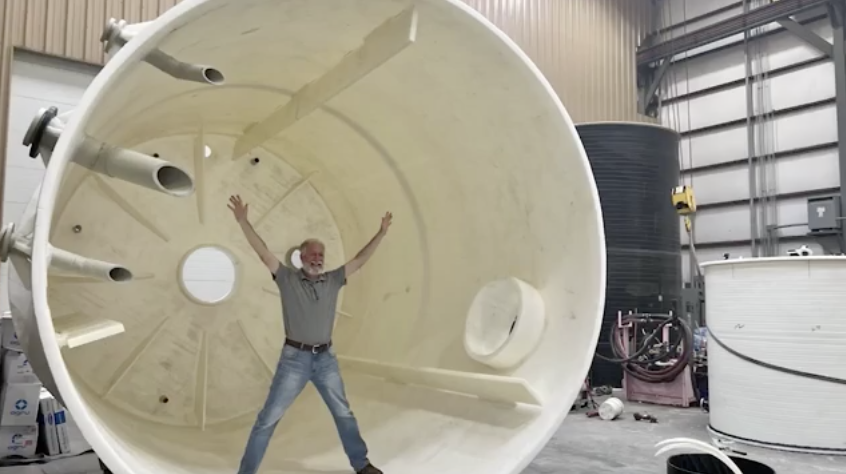
So the process is done by hand. It takes a while.
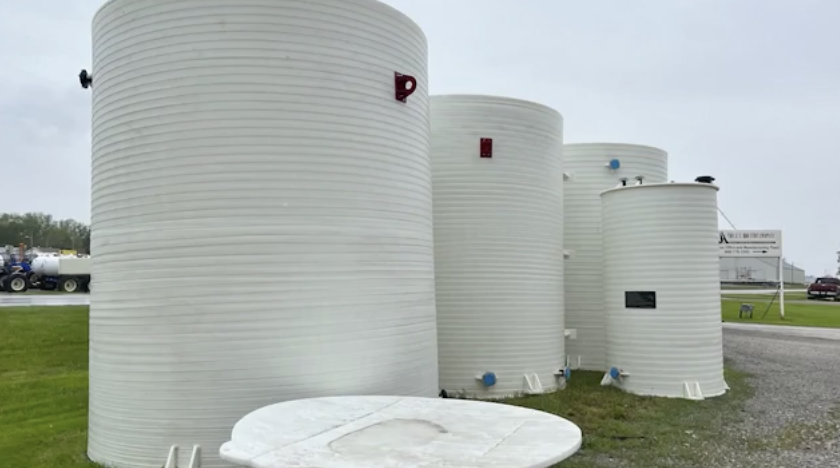
And this is why it takes very expensive. It's expensive material. It's an expensive process in the sense of it does require custom labor. These are unique manufactured products, so they are, they take time and expertise to create this. Now, the irony is these are insanely strong and won't corrode and that will last very long time and they'll be used for a lot of heavy industrial use. And honestly, it's a excellent replacement for steel or fiberglass or concrete basins. This is way better technology for doing tankage.
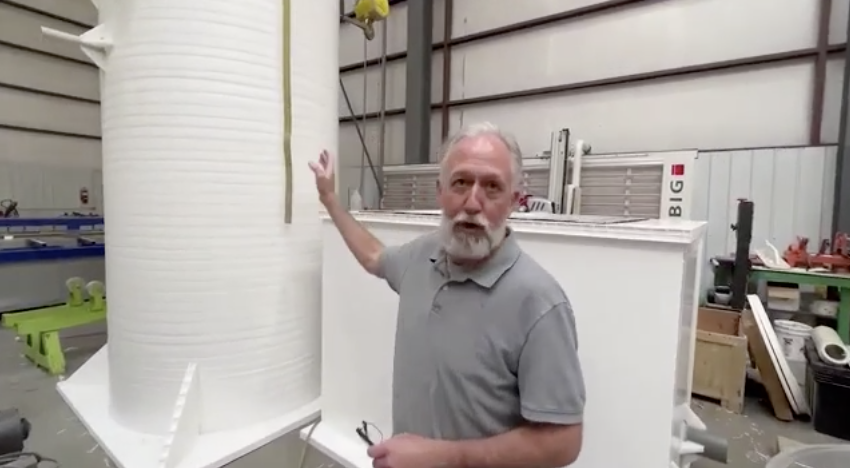
Dan: So this package is our commercial EveraMOD wastewater lift station product line. It's for a duplex submersible wastewater pumping system.
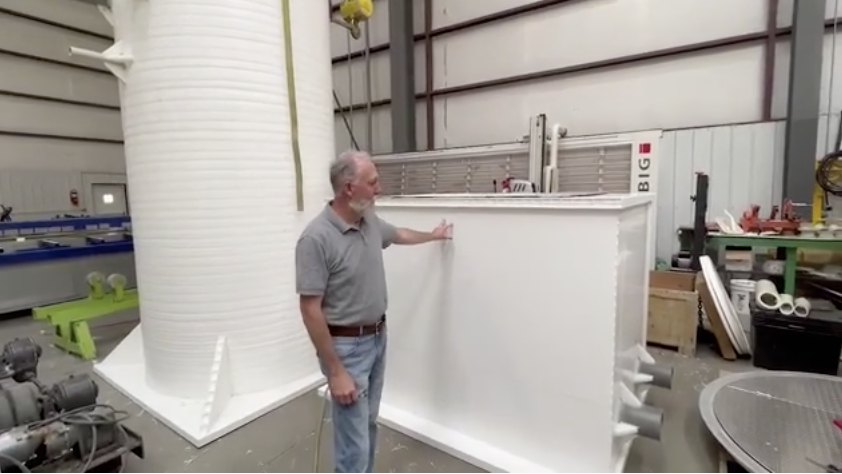
It is complemented by our rectangular valve vault system.
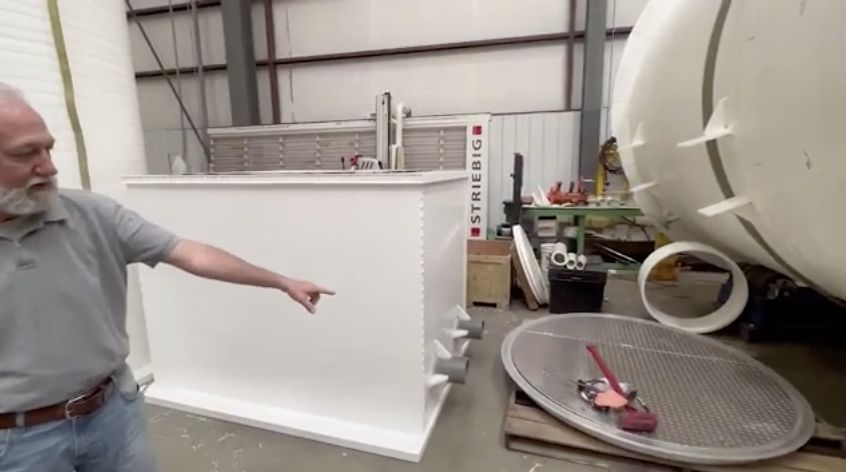
And you'll see we have our aluminum, aluminum frog-mouth access hatch that goes on the top of the pump station. And so this makes up the primary structural components that are part of the EveraMOD wastewater lift station product line.
End of video presentation
Strategic Partnership
Riggs: Houston Polytank is a major provider for us. And what we decided to do, because it's so good what they do, we decided to make a strong strategic partnership with them so they would make more of, because what Dan Early was having to do was send, have different contractors all over the country do different things. Houston Polytank just can do more and more in one shop, and it's going to be much more efficient. So these, those are these amazing high density polyethylene HDPE units that are the basis for this Modular Water Systems boom that's going on.
I can tell you that in May it looks like we are going to break $1,000,000 for Modular Water Systems alone. Remember that back in the day we used to get $1,000,000 a quarter from Progressive Water only. Now Progressive Water continues to grow. You saw how we were 55% higher on revenue in Q1. While Modular Water Systems is starting to explode. And this is really exciting. So we're going to be announcing that partnership, they're wonderful people. I thought I'd give you a little bit of this clip.
Audience Response
So I see I've got some great commentary here. So I'll catch up here a little bit and. "That is a genius." Keith, you're absolutely right. Chris Wirth says, "Love the Self-sufficient Cities Initiative, we should talk collaboration. Will work up proposal." Chris, I can't wait. Send it to me. Absolutely. And Melody says, Melody Petraglia says, "How does this program work? How do you start using this water on a personal level and how can you make money?"
Enabling Water Autonomy
This is very interesting. What we're doing is we're making it possible for communities to do their own water, full water independence. You could do any combination of it. The maximum would be your own water from a well. And then and then you treat your own water into a sludge pit kind of thing that's pumped out every six months. And then also you do that with the gray water reuse onto the lawns and so forth. So all these things would be completely end to end.
Last week we had, we showed what Ken is working on, which is a project in Pennsylvania being put in touch with a major developer who is connected to 40 plus developers in North Texas who we believe will be very excited about this. So the money that really is going to be made here is going to be by investors going in on, because remember, we can make it a good deal for the homeowners association by telling them, look, just pay on the meter.
But somebody's got to pay that machine. And so there is an investment to be made. And remember, this is an asset that generates income. And Eugene Tully says, "Great idea." I think you were talking about the relationship with Houston Polytank and how we're building up our ship.
Open Discussion
Actually, I've arrived at that magical moment. So it's the terrible duo, the dynamic duo.
Ken: The dynamic duo
Riggs: Duo dynamic. Thank you very much.
Ken: We used to be the terrible trio.
Riggs: Right, exactly. But the reason why I wanted to sort of roll into this is because I wanted to just comment on how responsive we are and how much we listen. Because one thing that was made. Oh, Melody, I'll get back to you. She wants to know how does crypto come into play and also, and also Gene wants to know Ken's direct line.
Ken: 877-440-4603 ext 201. But generally what I do is I would route them to my admin team and they get them on a calendar. So we have time. We can we can sit down and talk.
Riggs: We were highly responsive because last week we were so focused on Water on Demand that we didn't, we sort of sidestepped the value of OriginClear. And what's happening now is, and I do not have the time to do it, but we have a new institutional deck. It actually exists. I'm just not going to it's already 8:39, so I'm not going to show that. But it will be shown next week. And it is amazing.
OriginClear — Actual Worth
And here's what the point is. Water on Demand is the platform. It's by far the most important thing we're doing. It's a revolution in financing of water systems. It's the only water as a service that is being done "Like an Oil Well." In other words, regular investors and all kinds of good stuff like that. But then we're stacking a bunch of other things on it, and as a result, OriginClear is going to be unbelievably powerful.
Ken: Have all these have all these valuable properties within them. Right.
Riggs: And there was this we talk about Y Combinator, right? In fact, we have this cool spreadsheet which shows how Y Combinator at the beginning of Airbnb, you know, they put in $20,000 and they came out of it with 25 million. I think Y Combinator did. All right. Right.
Ken: So I think it was 88 million.
Riggs: You're right, value of holdings. That was the post-money valuation at the time. You're right, 88 million. So, 440,000% return on investment. So here's the thing. This and another example once again with, whereas looking for... here's Y Combinator again. So. Yeah. You want to you want to be the Airbnb, you want to be the Stripe, but you also want to be the Y Combinator.
Ken: Right, but you don't get to own Y Combinator. Y Combinator keeps it in. So it kind of in a much more direct response to Melody's question, how do we make money? Look, what, there are 150,000 water utilities spread out throughout the United States. Every one of them are making money. In other words, if you own those stocks, they pay you a dividend just to be a stockholder. So there's tons of money rolling in.
So imagine instead of 150,000, very large kind of archaic systems. Imagine a million small, really dealing with that very efficient, small, modern, efficient utilities. And instead of just getting a little dividend as a stockholder, getting an actual revenue stream as a direct participant in the royalty, that's how you make money. That's that's how we make money. We're not going to eliminate major water systems. We can add we can certainly add capacity.
What we're going to do is we're going to go out to the exurbs where where they can't operate. Right. Because it's just there's not enough population density out there for them to build billion dollar systems. But you can have 100, 200,000 systems out there, servicing tens of thousands of people in a way that is far superior to the major cities. I mean, is that, basically that's what we've been talking about and that's what I'm trying to do with that 50 acres.
Self-Sufficiency Mega-trend
Riggs: Exactly. So Water on Demand was focusing on this sudden mega-trend with Water4Us, the self-sufficient communities, and then moving into the crypto. Melody wanted to know a little bit about that. Now, it's very early for the crypto, but as I was laying out to Mariska, it's basically a two part system where on the one side we have a community of activists who are looking for water problems, alerting, going and sending it up to up, up the pole to a group of delegates, which then turn it into proposals and send them over to financing side.
And on the financing side, that's that dollar H2O, which is like, wrapped dividends. Very interesting. And I just ask that you stay tuned because we are working on what's going to show up in that deck is going to be an amazing multi line five year forecast showing, okay, here is how OriginClear rolls out. Here's how the crypto rolls out. Here's each of them rolling out. Echelons, boom, boom, boom, boom.
The Killer App
Ken: And Water on Demand is the keystone, as we discussed. That's important, right? Because everything is going to spring from that.
Riggs: Water on Demand is, to me is the killer app. It's the killer app, no question about it. But it is an enabler for all of this. And for example, Modular Water Systems, those polytank construction that was going on, those systems are designed specifically to be used in Water on Demand installations. Why? Because it's highly standardized. And also you can repossess them because they're modular. So what I believe is going to happen is that we're going to stun people with the value that OriginClear gets out of this because it will be like a multi property landlord basically, right?
Ken: I speak to investors about this, about just the one. When you actually begin to multiply that value add, those assets, the revenues that come back to the mother and each one of the... Look, one of the biggest hindrances for startup companies, right, is the admin costs. These things are going to go, these things are going to spin off lean, right? All of the, you know, all of the admin, all of the drag is going to be handled by the mothership. That's a huge advantage to the babies. It's also a major, major advantage to the parent.
About NASDAQ Listing
Riggs: Right. And so here's the thing. Some of our investors are like, "Don't tell me you're going to put Water on Demand on the Nasdaq before OriginClear." And I want to make it clear that companies can't go on the Nasdaq until they're two years old, at least. That's a requirement.
So Water on Demand is not going on to the Nasdaq for two years. And that's, believe me, that's actually very soon. Which will give us plenty of opportunity to build the asset base for OriginClear, because remember, all the assets that are built in Water on Demand are our equity, are assets for OriginClear because we're the owners, right?
Now. Think about that landlord example, that multi property landlord. You have for each of those properties, partners perhaps, and you have banks, right? But you have ten, 20 properties. That's where you get your strength as a multi property landlord. Right. It's, you could hold one property outright and be the only one and it'd be all you had. It would have less value than multiple ones where you had partners.
Ken: Right.
Riggs: Just adding on the value, but also the synergy of partners right? Now...
Ken: The performance risk. The narrowness of performance risk. Right. You have one you're a one trick pony.
Venture Capital?
Riggs: Correct. Jeannine? Hi, Jeannene. Well, Jeannene Mitchell wants to know, "Are you still wanting institutional investors, international institutional investors?" The answer is yes. We finally are able to do it, because what I decided to do, I discussed this on Friday with Andrea, and we decided he and Dustin, who's our world class investment analyst, are going to work with me specifically and 100% only on institutional, what we call sophisticated investors.
By that I mean I'm not going to go after some VC in Silicon Valley. We're going to go after people who are family office, high net worth. So they're still approachable, they're still individuals. They're not some faceless bunch of analysts who we're going to try and destroy you, but nonetheless, they want to have institutional grade requirements.
And so we're now ready and we're building that package. So, Jeannene, let's be in touch about that. We are, we were not happy about doing that, because here's the thing. Ken's mission is to work with the most important people we have, which are the accredited investors. And wasn't it cool to watch the CEO of Knightscope talk specifically about that, where, "No way am I working with a VCs! I like working with the real people who come back again and again."
Managing Generational Wealth
Ken: He said something that I've actually said, not those words, but I was like, I like this guy, right? So he said, look, and first of all, family offices, that's very important. Family offices right now want assets, assets, assets. And they're in failing assets. They're in very troubled and distressed assets right now. And this is generational wealth that they must protect.
They can't go and put the money into the market or into some crazy crypto. They have to protect it with long term multi year inflation-defensive strategies and those assets are failing. So I think this will be uniquely popular for the, for the family office. But he said something to the effect, the Knightscope CEO, he said, look, I'm not going to talk to a bunch of kids in Silicon Valley. Their model is to fail 90%, is to be right, is to be wrong 90% of the time. But their attitude is, is they are right 90% of the time. He goes, I'm not 26 years old. I don't need to deal with that.
I was like, I like this guy, right? Because that's the experience we've had, right? These venture capital firms. And don't get me wrong, we want to talk to them and we'll be ready for them when they're ready for us. Right. But right now, our really true touchstone, our individual investors who don't have access to major asset investments that actually make money.
Finding a Safe Harbor
In other words, people say, you've got something I want with Water on Demand. Let me participate. In other words, what do you always say? First, you speak to your, you speak to your enthusiast. You know, you deal with the later.
Riggs: You always market, you market to the enthusiasts first and never to the conservatives and skeptics because they'll come, they'll come eventually anyway they'll follow.
Ken: We all, we all, everyone we know, we're all accredited investors and we're all looking around and going, What are you doing with your money? Look, I'm losing money. What are you doing? I'm losing money. So, you know, I talked my friend Sutano, and I told him about the deal. He goes, I'm in. I go, I didn't invite you. He goes, Yeah, he goes, But I have to. He goes, I got to find something to put my money in. Well, anesthesiologists, you know, it's just the place to put money right now, We're in a bear market on Wall Street. It's a bear now.
Riggs: Okay? It's worse than that, my friend. And because you were you were sharing with me some pretty grim stuff. And what we've got to do is find a safe harbor.
Ken: Which you thankfully didn't share with the audience.
Riggs: Right, because it was like, whoa.
Ken: It was too grim. I know.
Enduring Asset
Riggs: But here's the thing. Water is not going to stop being good soon, so it's not going to go into recession. Number two, it's an asset. So it's it's not going to degrade. Number three, it's income bearing. Yes. That's a wonderful safe harbor for your money.
Ken: It checks all the boxes. Oh, and by the way, it's necessary for all life on earth. And the successful implementation can not only tell a eco minded or an environmentally conscious investor how many gallons of water they're saving on a on a on a yearly basis, but eventually, with enough of these systems out there, we will be able to calculate how many human lives are being saved.
There are 6000 children that died today from contaminated water. That's a scandal. And it's literally. What is it? What is it due to? Lack of access. Lack of capital. This provides capital which then provides access. It literally is the solution once scaled out.
Riggs: Now, I'm going to ask you a couple of questions before we wrap up. First of all, Melody would like to know if we don't qualify to invest, are there other ways to participate? And the answer is yes. We are going flat out to build the Regulation A Offering which we paid the lawyer already. He's building it. And we're today we were building the Kickstarter style funnel. Marketers working on that. So Regulation A means whatever the minimum is going to be 500 or 1000. I don't know what it's going to be, but it's going to not require to be accredited. You can invest up to 10% of your annual income or of your net worth either way. So most people can do a fair chunk two, three, four or five, 10,000, whatever. And that, I believe, is going to be a wonderful bedrock for if you look up Knightscope on start engine, you'll see your company here that built a huge robotic security company entirely from Regulation A Offering.
Ken: From from small investors. Right.
Riggs: Nothing but and so that, I believe, is the strength. And then the accredited investors get a special offering and they're still treated right. So, Melody, if you'll stay tuned, please feel free to buy stock on the open market. But the Reg A is coming. My hope is it will be after the July 4th break. We will have it running, but that's just a hope.
Audience Participation
And then quickly Emil George has a question, "What are all the different business lines of subsidiaries in OriginClear and how are they related? It gets confusing when you talk about each one and how it all ties together." I didn't have time today, but what I wanted to do, I wanted to do the the Death Star exploding animation. Here we are with all the different parts and then bloom and and it turns into all these different things. I was like, darn I just don't have the time.
Ken: The Big Bang, more like the Big Bang.
Riggs: Ish. Well, but it happens slowly.
Ken: To the universe.
Y Combinator of the Water Industry
Riggs: Anyway. But let me show you, Emil I'll show you one slide from the institutional deck to give you a sense of what we have, Water on Demand, income bearing capital for water as a service. And then the killer app is this Water4Us powering self-sufficient communities. We found that's where the demand is, but the engine is Water on Demand. Second is H2O, the first asset-based water coin.
Now EveraMOD is pump stations. That video you saw, the last thing that Dan showed was a pump station. That's what, and we are killing it in pump stations. We have one national account coming that it alone should be good for $5M a year. And that's one account. And that announcement will come. So that's the next roll out.
Then Modular Water Systems itself with its multiple patents and finally Progressive Water, which we've had forever since 2015 and has been a steady performer. It too, it actually turns out they have intellectual property as well. So now in that context, OriginClear is the mothership, provides all centralized finances and the spinoffs stay specialized. And we plan to go Nasdaq as the Y Combinator of water industry, high growth downside risk management through venture specialization. Each venture is its own thing.
This was the famous business unit strategy at Microsoft where they would roll out. You remember Microsoft Money. There were all these various things that remember they had a phone. None of these things worked. But because they were separate, independent business units, it didn't affect the overall company. And so the operating system and office and then SharePoint, there are certain things that worked really well. As they say, they achieved attachment for those things, right.
And certain things they didn't achieve attachment, but it was all right because they had these hits and that we're basically going to adopt this this Microsoft. Actually, it's a really great analogy, this Microsoft model, where you have individual units and they are highly specialized, but you have central services and that's the plan.
So with that, the first incubation is complete. And so basically we're now setting our first commercial pilot program and then it's about what is a managed service. And then we're rolling into the first application area, which is why for us with these self-sufficient communities where we already have customers paying us money. So it's important to remember, we've talked a lot Ken about the future, the future, the future, future when we have existing business.
Ken: It's pretty cool, right? I know.
Riggs: That are rocketed, they're booming.
Core Value
Ken: You know, it is our present is actually very, very, very strong, but it's not this gigantic global thing. So sometimes we overlook the fact that it's very, very important to talk about that. We're really very, very strong right now because people want to talk about making a difference in the world. Both are important. You can't make a difference in the world if your core isn't strong. And we do have a strong core. So I think it's very important to mention.
And look, as part of this spoke and hub theory, Emil, Water on Demand will power all of these different companies because it will be the latticework or provide a globalization ability by being essentially a managed services for water. It'll handle the movement of capital and the management of contracts. Right. Amazon doesn't own any retailers. Right. Yet it's the largest retailer in the world.
Airbnb doesn't own any hotels, but yet it's the largest hotelier in the world. Water on Demand could own literally, we could own all of those systems, but by virtue of having other people build them we'll simply be, really the largest of its kind in the world. And that will give birth to all of these other spinoff opportunities, which is really which creates this compounding effect on the mother company. That is just I mean, it's stunning.
Riggs: Ok, Last question of the night. Emil wants to know, "How will the accredited investor money be used? It's for Water on Demand only the funds will be used to build out the individual decentralized units in e.g. an exurb." And you're absolutely right. 100%. So here's the story. The money being raised currently that the use of the money here is shown in this slide where basically investment goes directly into Water on Demand for the royalty, for the percentage of Water on Demand Inc. And with the free granted preferred stock and cashless warrants. That is the, that is the use of proceeds. The money is going into these water assets. Talk to Ken about it. It's very exciting.
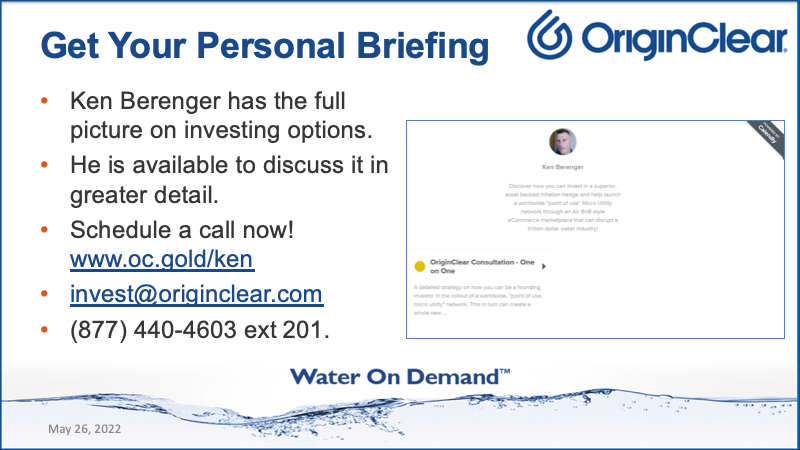
There'll be future opportunities to invest money in future rollouts. But we want you to have a win with this one. We want you to make make like a bandaid on this one because I think it's going to be very exciting. We have the projects ready to go and we're going to rock it.
Ken: One one last comment to Emil. These exurb projects which I'm trying to create one myself, the same exact modality, the same exact mentality, financed the exact same way work for businesses and agriculture and commercial locations all over the all over the country. So it's the same, it's the same mantra. They have slightly different ways of processing water, but it's all about, you can rent a beach, you can rent a beach house at Airbnb, or you can rent a high rise apartment. They don't care, right? We're agnostic in the same way, and that is our strength.
Riggs: But with that, we've we've managed to chew up an entire hour. It's been amazing. And I love how many people have stuck around. It's been fascinating. Thank you for being so, so loyal. I know there's a lot of people show up kind of late, like I'm not going to go through the whole safe harbor and stuff. But you certainly got into the interesting stuff. We have lots to tell you.
We're going to go into much greater, much deeper dove on this strategic investor PowerPoint because it goes beyond what on demand, which is Ken's focus right now to go. Okay, let's take a look. The five year plan, it will be in there. You're going to love it. So please come back next week. It's been amazing having you. And Sharon says, "I love this and thanks for taking the time to keep us informed." Eugene says, "Great presentation," Stevan says, "Thanks for a great presentation."
Ken: Stevan Davis. Steven, Hi Steven.
Riggs: Stevan brother. And actually I Christopher Null a note because he checked in with me, too. But we'll talk about that. Everyone, have a wonderful weekend. See you next week. And Emil it's been a great pleasure answering your questions. We love it when people get interactive. So do stay tuned. Thank you all and have night.
Ken: Good night now.
Register for the next Insider Briefing: HERE
%20250px.png?width=250&height=53&name=OriginClear%20Logo%202019%20(RGB)%20250px.png)




